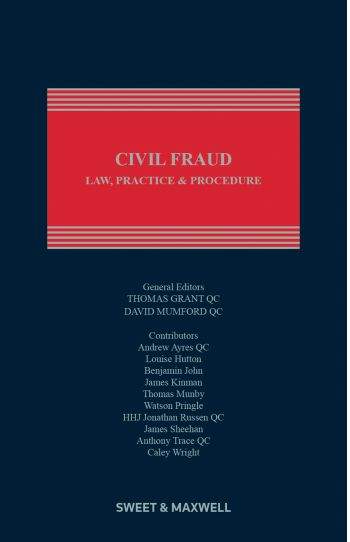Description
Civil Fraud: Law, Practice & Procedure is designed to be the primary port of call for all practitioners conducting a civil fraud case. It deals with the subject comprehensively, combining in-depth legal analysis with a solidly practical approach.
The authors focus throughout on the real-life situations that litigants in this area regularly encounter and offer effective guidance on the complex practical and procedural issues that can arise.
The book starts with an examination of common factual and legal scenarios in a fraud case, which can be difficult to navigate even for the most experienced litigators. The remainder of the text develops the legal, practical, and procedural issues flowing from such scenarios.
The authors, drawing on a wealth of experience in litigating fraud claims, bring together the disparate areas of the law that fall under the label “fraud”, from the substantive causes of action – common law, restitution and equitable claims, and claims arising under the statute – through to remedies. It provides a full and comprehensible treatment of the myriad procedural swords and shields that can be used in fraud litigation, including freezing orders, proprietary and other injunctions, search orders, receivership, ancillary orders and the increasingly-used contempt jurisdiction.
The book also considers the key international aspects of civil fraud litigation. This is a primary ‘single source’ point of reference which avoids the need to navigate a whole series of texts in a field where practitioners often work under considerable time pressure.
Civil Fraud: Law, Practice & Procedure works as a road map to take the practitioner from the moment of initial instructions through to a completed legal and practical analysis, whether at the various interlocutory stages or trial.
- Contents:
- Chapter 1: Deceit
- Chapter 2: Conspiracy
- Chapter 3: Inducing Breach of Contract
- Chapter 4: Unlawful Interference
- Chapter 5: Intimidation
- Chapter 6: Malicious Falsehood
- Chapter 7: Bribery
- Chapter 8: Conversion
- Chapter 9: Establishing a Trust
- Chapter 10: Breach of Trust
- Chapter 11: Fiduciary Duties
- Chapter 12: Knowing Receipt
- Chapter 13: Dishonest Assistance
- Chapter 14: Unjust Enrichment
- Chapter 15: Undue Influence and Duress
- Chapter 16: Statutory Claims
- Chapter 17: An Introduction to the Key Concepts
- Chapter 18: Piercing the Corporate Veil
- Chapter 19: Attribution
- Chapter 20: Joint Liability in Tort
- Chapter 21: Damages
- Chapter 22: Equitable Remedies: Rescission, Account of Profits, Compensation and Forfeiture
- Chapter 23: Equitable Proprietary Claims
- Chapter 24: Illegality
- Chapter 25: Limitation
- Chapter 26: Section G: Interim Remedies – The Court’s Powers to Grant Interim Relief
- Chapter 27: The Without Notice Application
- Chapter 28: Freezing and Proprietary Injunctions
- Chapter 29: Disclosure Orders
- Chapter 30: Search Orders
- Chapter 31: Other Interim Remedies
- Chapter 32: The Return Date
- Chapter 33: Receivership
- Chapter 34: Proving a Claim in Fraud: Evidence and Other Trial Issues
- Chapter 35: Contempt of Court
- Chapter 36: Other Sanctions for Procedural Default
- Chapter 37: Enforcement of Judgments
- Chapter 38: Setting Aside a Judgment for Fraud
- Chapter 39: Jurisdiction Issues
- Chapter 40: Conflict of Laws;


Reviews
There are no reviews yet.